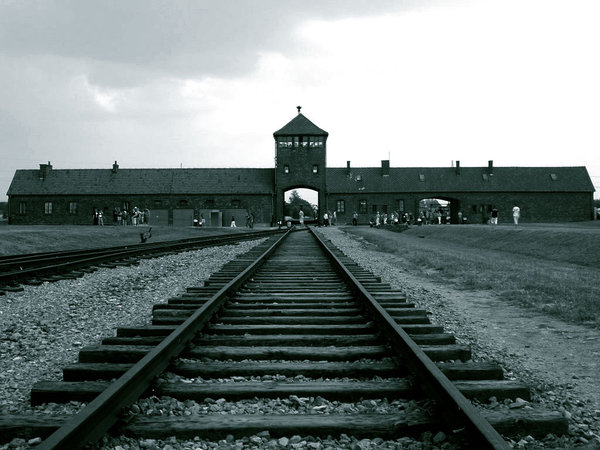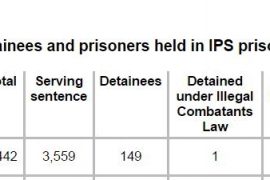 Today marks the 70th anniversary of the liberation of Auschwitz-Birkenau. Roughly one out of every six Jews killed by the Nazis during the Holocaust died between 1940 and 1945 at the Auschwitz camp complex in south-west Poland – a facility known as “the largest mass murder site in human history”.
Today marks the 70th anniversary of the liberation of Auschwitz-Birkenau. Roughly one out of every six Jews killed by the Nazis during the Holocaust died between 1940 and 1945 at the Auschwitz camp complex in south-west Poland – a facility known as “the largest mass murder site in human history”.
The official Jan. 27th Guardian editorial on the significance of commemorating the anniversary of the camp’s liberation seems determined to honor the memory of the Jewish victims, yet appears at a loss to explain why they were murdered, and thus fails in the most important task of any serious meditation on the Holocaust: what moral lessons we must learn.
We’ll include the entire text of the editorial in order to fully contextualize the omission.
The facts are, wrote Hannah Arendt in 1946, “that six million Jews, six million human beings, were helplessly, and in most cases unsuspectingly, dragged to their deaths”. Human history, she added, “has known no story more difficult to tell”. In the years since those facts first became known, the story of the Holocaust has been told and retold, yet it still remains obdurately difficult to tell.
Scholarly inquiry, the search for causation, the most meticulous reconstruction, the grave questions of theologians and of thinkers like Arendt herself, the wrenching accounts of survivors, the discovered testimony of victims like Anne Frank – it all goes only so far. The unknowability of the Holocaust was famously, if inadvertently, expressed by the guard at Auschwitz who curtly told Primo Levi:“There is no why here.” We cannot in the end explain the Holocaust: it is beyond explanation.
The converse is not true. We cannot explain the Holocaust, yet, in large measure, it explains us. The Holocaust set the moral, ethical and geopolitical parameters within which the western world lives, influenced international institutions, sits balefully on the shoulders of writers and artists, and is never entirely absent from our minds.
Nor should it be, even though new horrors and new problems have inevitably emerged. If we were ever to lose our consciousness of the Holocaust, we would lose the moral fresh start that victory over the Nazi state gave us, the determination that such a thing should never be allowed to happen again and that we should always be on the watch for early signs of the disease that led to it. That is one reason why many in the last generation of survivors of the camps, or those who escaped to Britain or America in the nick of time, are making a final effort to imprint on the minds of the young some sense of the enormity of what happened.
They are speaking now because soon they will not be able to speak. They are speaking, also, to a Europe where minorities once again feel themselves at risk: Jewish communities gripped by a new insecurity, Muslim communities that sense the slow swell of hostility in the wake of jihadist outrages like the massacre at Charlie Hebdo. True, a sprinkling of far-right parties, from Golden Dawn in Greece to Svoboda in Ukraine, is far from constituting a fascist revival. We are not on the road to another Auschwitz. But that is, in part, because we remember what happened there.
Those who are gathering there for the 70th anniversary of the camp’s liberation by Russian troops, particularly the handful of elderly survivors, are determined that we should continue to remember. Some other aspects of the occasion give cause for concern. This is one time when the current difficulties with Russia should have been overlooked, yet Vladimir Putin has not been formally invited and is not coming.
Of course, Russia has been playing politics with its charges that neo-fascists are on the march in Ukraine. All the more reason to recall the ideal of wartime unity. And there will be countries represented at Auschwitz on Tuesday, especially from central and eastern Europe, that have not faced up to the participation of their own citizens in the death camps in the thoroughgoing and agonised way in which Germany itself finally faced up to its Nazi past.
The Holocaust was a murder in the European family, a shame from which Europe will never entirely recover. It is seen differently outside the old continent. America, rightly or wrongly, has less sense of responsibility for that shame, but a great determination to preserve Israel, a determination that has profoundly changed the Middle East. Israel itself, coming late to its own reckoning with what happened in Europe, has sometimes been led by those ready to exploit its vulnerability, but that does not mean the vulnerability is not viscerally felt: a people who came close to extinction cannot be blamed for not wanting to put their fate ever again in other hands. The Arabs, meanwhile, cannot be blamed for feeling that Europe’s blood debt to the Jews was paid with what they see as their territory. Beyond Europe, what was once a terrible but distant event in the colonial metropolis has seemed more relevant after Cambodia and Rwanda. Auschwitz now belongs to us all.
A few quick observations:
First, note the gratuitous swipe at Israel.
Though they acknowledge that “a people who came close to extinction cannot be blamed for not wanting to put their fate ever again in other hands”, editors nonetheless can’t resist accusing unnamed Israeli leaders of “exploiting” the Holocaust. They also legitimize the narrative which sees in Israel’s very creation an undeserved “punishment” of Palestinians for Europe’s sins – omitting the Palestinian leadership’s own extensive collusion with the Nazis.
In the fifth paragraph, editors, in vaguely referring to “recent Jewish insecurities”, note the attack on Charlie Hebdo offices in Paris, but – quite curiously – not the subsequent murder of four Jews at the Hyper Cacher Kosher Supermarket. This small omission in one particular paragraph represents a larger one within the full 720 word editorial: the absence, in any context, of the word “antisemitism”.
Though editors are narrowly right that the nature of human evil displayed by the perpetrators of the Holocaust may be unknowable, we certainly do know that antisemitism is what inspired the organized effort by Nazis and their willing executioners to exterminate Europe’s Jews.
Though elsewhere on the pages of the Guardian, their editors and contributors have indeed taken note of the exodus of Jews from France and elsewhere in the wake of a very well-documented uptick in antisemitic incidents, their latest editorial seemed determined not to view Holocaust commemoration through the lens of a specific racist legacy, but within the framework of the fight against an amorphous ‘intolerance’.
An editorial about the Holocaust which omits mentioning antisemitism seems to us akin to a US newspaper publishing an editorial about American slavery without contextualizing the black struggle against white racism.
Whilst it is the belief of this writer that the Guardian has made some significant strides in dealing with issues of concern to the Jewish community, their latest Holocaust editorial suggests a continuing institutional failure to confront the scourge of antisemitism in a way that’s intellectually serious, honest and brave.




